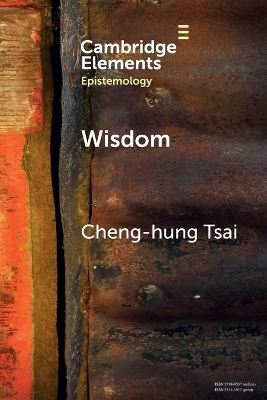
Wisdom
A Skill Theory
Seiten
2023
Cambridge University Press (Verlag)
978-1-009-22289-1 (ISBN)
Cambridge University Press (Verlag)
978-1-009-22289-1 (ISBN)
This Element addresses questions regarding the nature and acquisition of wisdom by developing and defending a skill theory of wisdom. It develops this theory and defends it against two objections to the effect that there are asymmetries between wisdom and skill.
What is wisdom? What does a wise person know? Can a wise person know how to act and live well without knowing the whys and wherefores of his own action? How is wisdom acquired? This Element addresses questions regarding the nature and acquisition of wisdom by developing and defending a skill theory of wisdom. Specifically, this theory argues that if a person S is wise, then (i) S knows that overall attitude success contributes to or constitutes well-being; (ii) S knows what the best means to achieve well-being are; (iii) S is reliably successful at acting and living well (in light of what S knows); and (iv) S knows why she is successful at acting and living well. The first three sections of this Element develop this theory, and the final two sections defend this theory against two objections to the effect that there are asymmetries between wisdom and skill.
What is wisdom? What does a wise person know? Can a wise person know how to act and live well without knowing the whys and wherefores of his own action? How is wisdom acquired? This Element addresses questions regarding the nature and acquisition of wisdom by developing and defending a skill theory of wisdom. Specifically, this theory argues that if a person S is wise, then (i) S knows that overall attitude success contributes to or constitutes well-being; (ii) S knows what the best means to achieve well-being are; (iii) S is reliably successful at acting and living well (in light of what S knows); and (iv) S knows why she is successful at acting and living well. The first three sections of this Element develop this theory, and the final two sections defend this theory against two objections to the effect that there are asymmetries between wisdom and skill.
Introduction; Part I. A Skill Theory of Wisdom Presented: 1. Wisdom as knowing how to live well; Part II. The Theory Developed: 2. Wisdom and knowing the whys; 3. Wisdom and knowing what matters; Part III. The Theory Defended: 4. The deliberation objection: deliberation about final ends; 5. The feedback objection: feedback for skill acquisition; Conclusion; Appendix; References.
| Erscheinungsdatum | 09.01.2023 |
|---|---|
| Reihe/Serie | Elements in Epistemology |
| Zusatzinfo | Worked examples or Exercises |
| Verlagsort | Cambridge |
| Sprache | englisch |
| Maße | 152 x 229 mm |
| Gewicht | 127 g |
| Themenwelt | Geisteswissenschaften ► Philosophie ► Erkenntnistheorie / Wissenschaftstheorie |
| Geisteswissenschaften ► Philosophie ► Ethik | |
| Geisteswissenschaften ► Psychologie ► Humanistische Psychotherapien | |
| ISBN-10 | 1-009-22289-9 / 1009222899 |
| ISBN-13 | 978-1-009-22289-1 / 9781009222891 |
| Zustand | Neuware |
| Informationen gemäß Produktsicherheitsverordnung (GPSR) | |
| Haben Sie eine Frage zum Produkt? |
Mehr entdecken
aus dem Bereich
aus dem Bereich
die Grundlegung der modernen Philosophie
Buch | Softcover (2023)
C.H.Beck (Verlag)
CHF 25,20
Buch | Softcover (2023)
Reclam, Philipp (Verlag)
CHF 9,80

![Was heißt Denken?. Vorlesung Wintersemester 1951/52. [Was bedeutet das alles?] - Martin Heidegger](/media/113619842)
